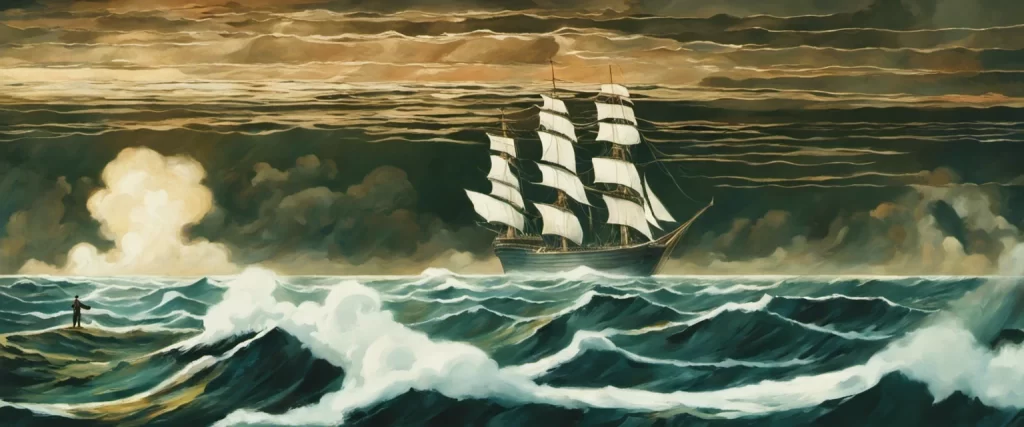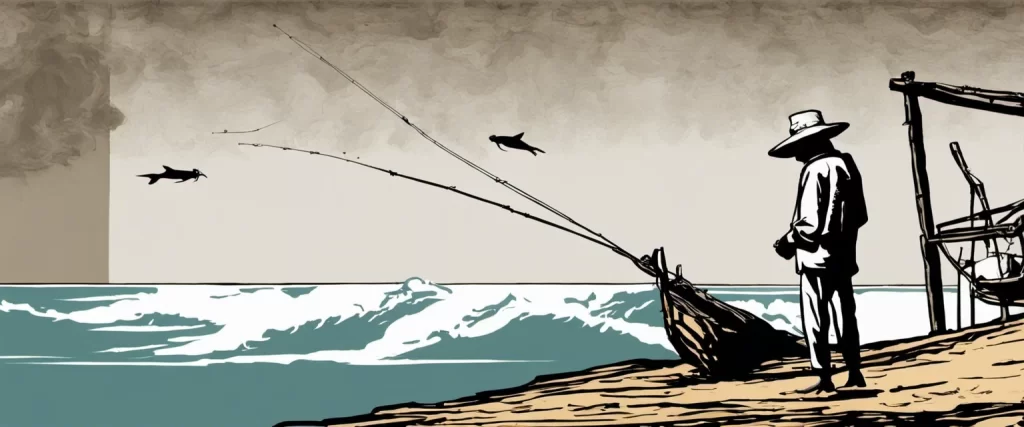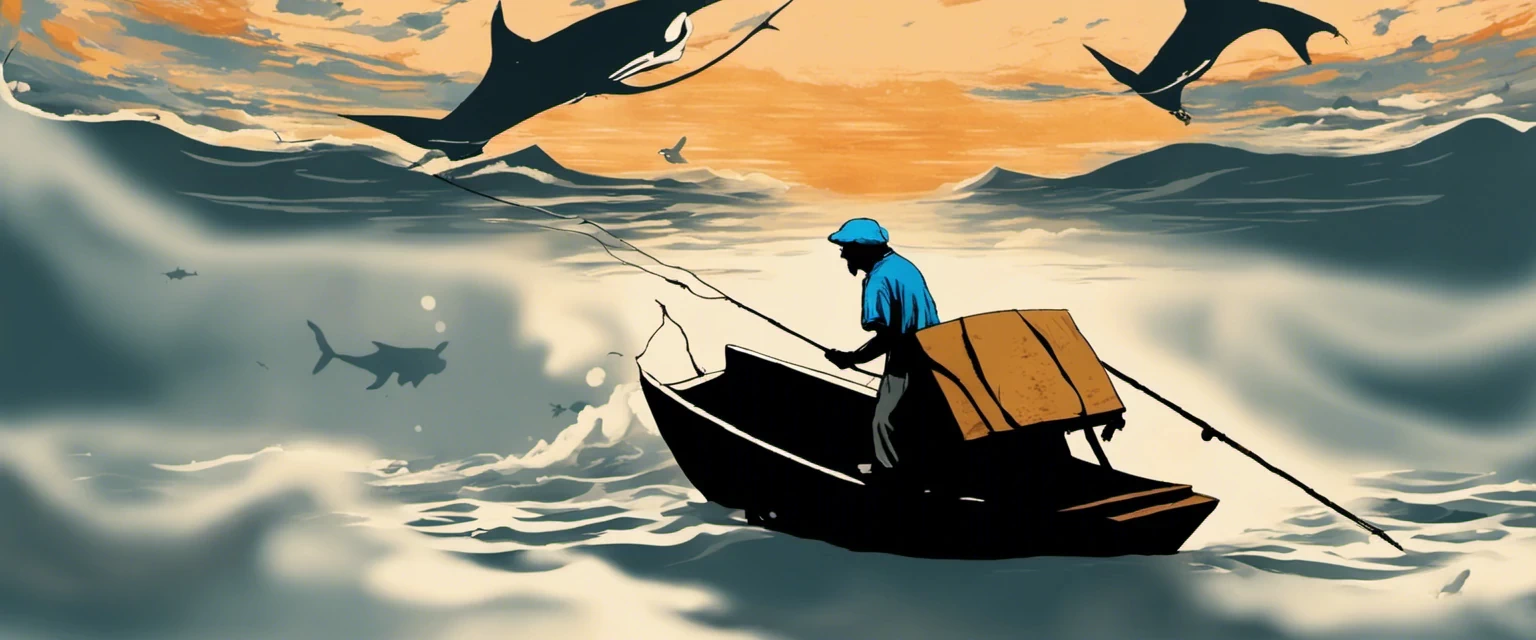—The Old Man and the Sea & Moby-Dick
Literature is often regarded as a reflection of the human condition, providing profound insight into the complexities of life, the human spirit, and our relationship with the natural world. Within this vast realm of literary works, two towering novels stand out, both exploring the themes of man’s struggle against nature and the timeless quest for meaning in an unforgiving universe. Ernest Hemingway’s “The Old Man and the Sea” and Herman Melville’s “Moby-Dick” are masterpieces that epitomize these themes, captivating readers with their visceral portrayal of human tenacity, existential questioning, and the intrinsic bond between man and the natural world.
At first glance, these two novels may seem worlds apart, one set in the seemingly serene waters of the Gulf Stream, and the other embarking on the treacherous journey across the vast expanses of the ocean. However, a deeper analysis reveals fascinating similarities and differences that go beyond the surface. Both Hemingway and Melville delve into the realm of human struggle, employing complex characters and thought-provoking narratives to convey a profound exploration of the human condition. While “The Old Man and the Sea” is a concise and poetically precise novella, “Moby-Dick” sprawls across an epic voyage, incorporating multiple narratives and an encyclopedic wealth of knowledge.
In this comparative study, we shall delve into the thematic, structural, and stylistic aspects of both novels, with the intention of uncovering the shared motifs as well as the distinctive features that set them apart. By closely examining the portrayal of the protagonists, the exploration of the natural world, the symbolic use of marine creatures, and the underlying philosophical messages, we aim to decipher the unique qualities that make these novels timeless classics in their respective literary canons.
Furthermore, it is important to acknowledge that both Hemingway and Melville were not only literary giants of their time but also keen observers of human nature, drawing inspiration from their personal experiences with the sea. Hemingway was an avid fisherman, well-acquainted with the raw power and unpredictability of the ocean, while Melville’s adventurous past as a sailor equipped him with a deep understanding of maritime life. These real-life encounters with the elements inevitably shaped their storytelling, infusing their narratives with a sense of authenticity that rings true throughout the pages.
Through this comparative study, we aim to provide a comprehensive analysis that celebrates the unique genius of both authors, while also offering readers a deeper appreciation of the universal themes and timeless questions that these two remarkable novels continue to provoke. Delving into the depths of “The Old Man and the Sea” and “Moby-Dick,” we embark on a literary exploration that promises to shed light on the profound mysteries of life, the boundless power of human spirit, and the captivating allure of the boundless sea.
Brief Summary of Two Books
The Old Man and the Sea by Ernest Hemingway
The Old Man and the Sea” by Ernest Hemingway tells the story of an aging Cuban fisherman named Santiago who, after enduring a long streak of bad luck, sets out on an epic battle against a massive marlin in the waters of the Gulf Stream. Despite his strength and determination, Santiago finds himself physically and mentally tested as he struggles to land the mighty fish. Throughout the ordeal, he reflects on his life and the importance of preserving one’s dignity in the face of adversity. The novella explores themes of perseverance, heroism, and the human struggle against nature’s unforgiving forces.
Moby-Dick by Herman Melville
Moby-Dick is an epic novel written by Herman Melville that follows the journey of Ishmael, a young sailor, who joins the crew of the whaling ship Pequod. The ship is captained by Ahab, a vengeful and obsessed man seeking revenge on the giant white whale, Moby Dick, who had previously injured him.
As the crew embarks on their voyage, Ishmael becomes acquainted with the diverse group of sailors and their roles on the ship. Ahab’s quest for revenge consumes him, and he pushes the crew to the brink of madness and ruin. The novel delves into various themes such as obsession, the nature of evil, and the human struggle against the indifferent forces of the universe.
Throughout their journey, the crew encounters different whales, engages in dangerous hunts, and endures storms. But Ahab’s obsession with Moby Dick remains constant, and as they finally come face-to-face with the massive whale, the ship is ultimately destroyed, resulting in the death of almost everyone on board.
Moby-Dick is not only a story of a man’s revenge against an animal but also a philosophical exploration of man’s place in the universe, the nature of obsession, and the complexities of the human spirit.
Comparison between Two Books

Similarities in perseverance
The Old Man and the Sea by Ernest Hemingway and Moby-Dick by Herman Melville both depict characters who demonstrate extraordinary perseverance in the face of great challenges.
One similarity that stands out is the unwavering determination of the protagonists. In The Old Man and the Sea, Santiago, an old Cuban fisherman, goes on an arduous journey to catch a massive marlin fish despite months of bad luck. He faces intense physical strain, exhaustion, and isolation but remains resolute in his pursuit. Similarly, in Moby-Dick, Captain Ahab becomes consumed by his obsession to seek revenge against the giant white whale that took his leg. Despite the risks and personal sacrifices, Ahab refuses to give up, even in the face of insurmountable odds.
Another parallel lies in their ability to find strength in solitude. Santiago spends several days alone at sea, battling against nature’s forces and his own inner demons. Through his solitary struggle, he discovers an inner resilience and spirit that sustains him. In Moby-Dick, Ahab isolates himself from the rest of the crew to devote himself entirely to his mission. He immerses himself in his quest, finding solace and strength in his single-minded determination.
Furthermore, both stories showcase the enduring power of the human spirit. Despite their physical hardships and emotional turmoil, Santiago and Ahab refuse to succumb to defeat. Their perseverance stems from a deep-seated belief that they are meant to overcome their challenges, no matter how formidable they may be. Both characters embody a sense of unwavering faith and an unyielding willpower that ultimately drive them forward.
In conclusion, The Old Man and the Sea and Moby-Dick share notable similarities in demonstrating the theme of perseverance. Through the unwavering determination of Santiago and Ahab, their ability to find strength in solitude, and their unwavering belief in their mission, both novels illustrate the indomitable human spirit and the power it possesses to overcome the greatest of obstacles.
Divergences in perseverance
The Old Man and the Sea by Ernest Hemingway and Moby-Dick by Herman Melville are both celebrated works of literature that explore themes of resilience and perseverance. However, they diverge in their portrayal of the concept of perseverance.
In The Old Man and the Sea, Hemingway presents a story of unwavering determination and the indomitable human spirit. The main protagonist, Santiago, is an aged fisherman who has gone for 84 days without catching a single fish. Despite the odds stacked against him and the immense physical and mental challenges he faces, Santiago refuses to succumb to despair. He embodies the idea that even in the face of failure and adversity, one should persist with unwavering dedication.
Hemingway illustrates Santiago’s perseverance through his struggles against the marlin, a colossal fish that exemplifies Santiago’s desire for something greater. The battle between man and fish becomes a metaphor for life itself, highlighting Santiago’s unyielding commitment to his goals. Even when his hands are shredded, his body aching, and his mind exhausted, Santiago refuses to give up. He displays an unwavering resolve to conquer the sea and emerge victorious, regardless of the obstacles he encounters.
On the other hand, Moby-Dick by Herman Melville offers a contrasting narrative on perseverance. While the novel does touch upon themes of endurance and determination, it explores the dangers of obsessive pursuit. Captain Ahab seeks vengeance against the white whale, Moby-Dick, after it viciously maims him, resulting in an all-consuming determination to destroy the creature at any cost.
Ahab’s relentless pursuit of his goal becomes a detrimental obsession. In his single-mindedness, he neglects his crew’s safety and disregards the dangers posed by his perilous mission. This overarching fixation on revenge ultimately leads to the demise of the ship and the crew, highlighting the negative consequences of relentless perseverance without consideration for the well-being of oneself and others.
While both The Old Man and the Sea and Moby-Dick explore the notion of perseverance, they diverge in their underlying messages. Hemingway champions the concept of unwavering dedication, portraying Santiago as a symbol of perseverance triumphing against all odds. In contrast, Melville’s novel offers a cautionary tale, cautioning readers about the potential perils of unrelenting obsession while pursuing one’s goals. Through these diverging portrayals, readers are left with two distinct perspectives on perseverance, ultimately leading to a deeper understanding of the complexities surrounding this virtue.

Conclusion
The question of which book is more worthy of reading, between “The Old Man and the Sea” by Ernest Hemingway and “Moby-Dick” by Herman Melville, ultimately depends on personal preferences and interests. Both books are considered literary classics and have made significant contributions to the world of literature.
“The Old Man and the Sea” is a short novel that tells the story of an aging Cuban fisherman named Santiago and his relentless battle with a giant marlin in the Gulf Stream. Hemingway’s writing style is characterized by simplicity, economy of words, and a focus on existential themes of struggle, endurance, and the human spirit. It is a poignant tale of determination and resilience that explores the themes of age, isolation, and the relationship between man and nature.
On the other hand, “Moby-Dick” is a sprawling epic novel that delves into philosophical, psychological, and metaphysical depths. It follows the story of Captain Ahab and his obsession with hunting down the legendary white whale. Melville’s writing style is dense, richly layered with symbolism and literary allusions, and encompasses a multitude of themes such as humanity’s struggle against nature, the nature of evil, and the complexities of human nature.
Both books offer significant insights into the human condition and explore themes that resonate with readers. “The Old Man and the Sea” is a concise and accessible read that can be appreciated for its evocative storytelling, while “Moby-Dick” is a complex and profound work that rewards readers who are willing to delve into its intricacies.
Ultimately, the choice between the two books depends on the reader’s preferences. If you prefer concise, straightforward writing and a focus on the human spirit, “The Old Man and the Sea” may be more appealing. However, if you enjoy dense, thought-provoking works that delve into profound themes and are willing to invest time and effort, then “Moby-Dick” may be the better choice.



